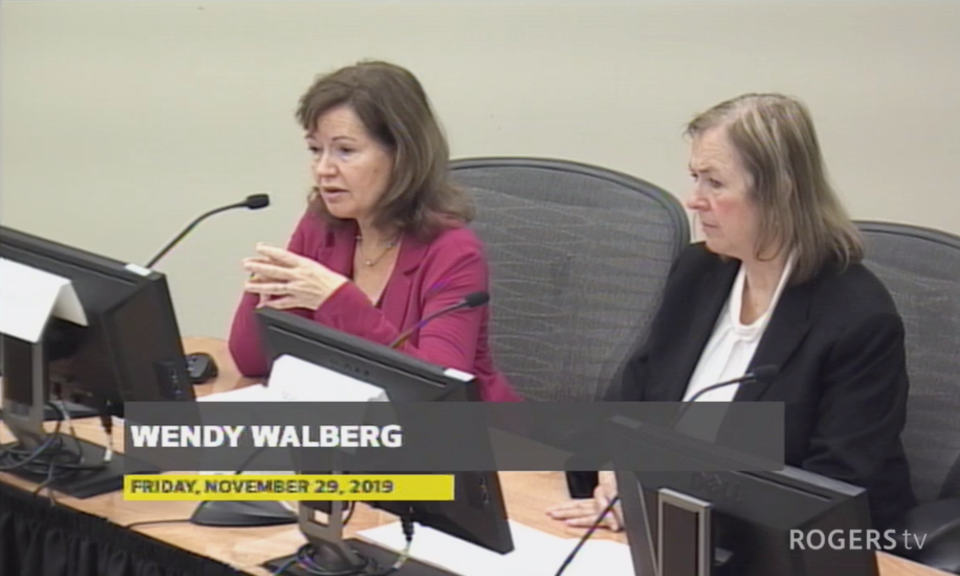Clearly defined roles are the key to a successful, and transparent, municipal corporation, according to two experienced City solicitors.
Today, the Collingwood Judicial Inquiry heard from a panel including Mississauga city solicitor Mary Ellen Bench and Toronto city solicitor Wendy Walberg, who shared their expertise on the roles, responsibilities, and accountability of municipal boards and corporations.
In Collingwood’s case, the town had a municipally-owned corporation and board operating its electricity distribution company (COLLUS). At the time, then-mayor Sandra Cooper represented council on the Collus board, and the CEO of COLLUS was Ed Houghton, who was simultaneously the director of public works for the town, and who later also became the chief administrative officer for the Town of Collingwood.
“For staff and for others involved, role clarity is key,” said Bench. “It’s fundamental to understanding what your relationship is and what are the expectations in terms of responsibilities.”
Walberg said without role clarity, there is potential for conflict, and not necessarily conflict of interest, but conflicting directions from the various board members, council, and staff.
“If the roles aren’t clear, you have the freedom to decide how you’re going to carry it out yourself, and that may or may not be going the way council wants,” said Bench.
Practically speaking, Bench and Walberg said the roles could be defined through a service matrix that is used for vetting appointees to the board, and is included in the official document appointing the member to the municipal corporation board.
In her role as city solicitor for Mississauga, Bench drafted the city’s first council code of conduct and was engaged in hiring all of the city’s integrity commissioners. She also participated in drafting the city’s first staff-council relationship policy.
At today’s inquiry, Bench responded to questions about municipal staff also holding senior roles within a municipal corporation.
“It’s allowable, and I’ve seen it happen,” said Bench. “Generally, when municipal staff are in that role, the expectations are clearly laid out.”
She further suggested municipal staff can be chosen for their expertise on the subject matter coupled with their understanding of what their relationship is in terms of dealing with the corporation and the municipality.
She added those staff are usually placed in an administrative role as opposed to a strategic role.
“The board’s job is to be the strategic policy direction part of the corporation,” said Bench. “The role of staff is to carry out those responsibilities and move them forward.”
The discussion this morning also included further prodding into exactly where a board’s direction comes from. According to the panellists, it’s the direction of council (as shareholder) that steers a municipal corporation.
Walberg said it’s her experience that a municipal board receives direction through an official council decision document created through a voting process that follows the regulations of the Municipal Act.
Law pertaining to municipally-owned local distribution companies (like Collus) requires the shareholders (town council) to provide oversight of the company through the board of directors.
“As a shareholder, the municipality receives dividends and has the rights to vote on mergers, acquisitions, and similar changes to the corporation,” states a presentation slide created by Bench and Walberg for the Collingwood Inquiry hearing today.
“So if you wanted a corporation to obtain a valuation … council could direct the directors to do that?” asked Commissioner Associate Chief Justice Frank Marrocco.
“It could happen like that, yes,” said Bench.
Currently, the inquiry is hearing from several panellists of experts in municipal governance for the final phase of hearings.
The experts - including many lawyers, judges, and integrity commissioners - have donated their time to come to the Collingwood inquiry and provide information and opinions they’ve gathered throughout their careers.
Associate Chief Justice Frank Marrocco, as the inquiry’s commissioner, can use the information they have provided to formulate his final report and recommendations after the inquiry.
Previous phases of the Collingwood inquiry hearings dealt with the 2012 share sale of 50 per cent of Collus to PowerStream, and the subsequent allocation of sale proceeds to build two recreation facilities.
The hearings continue this afternoon at 2 p.m. with a panel on procurement and best practices including Marian MacDonald and Mike Pacholok.
MacDonald was the assistant deputy minister of Supply Chain Ontario, and led a team of more than 180 procurement professionals overseeing $6 billion in annual spending. She developed and implemented procurement policies and processes in the Ontario Public Service and Broader Public Sector.
Pacholok was the chief purchasing officer for the City of Toronto, which gives him oversight over close to $2 billion spent on goods and services per year. He leads a staff of 140 people, and has lead large-scale procurement transformations within the city.
You can watch the hearings live in person at the town hall council chambers, on RogersTV, or online here.



